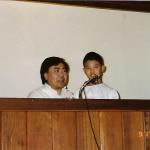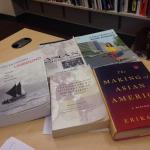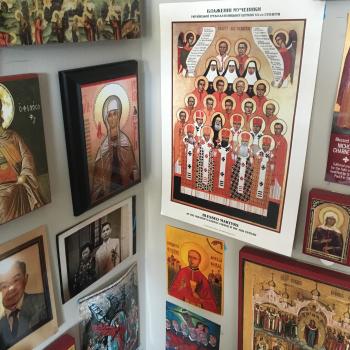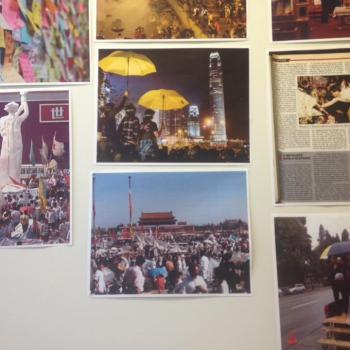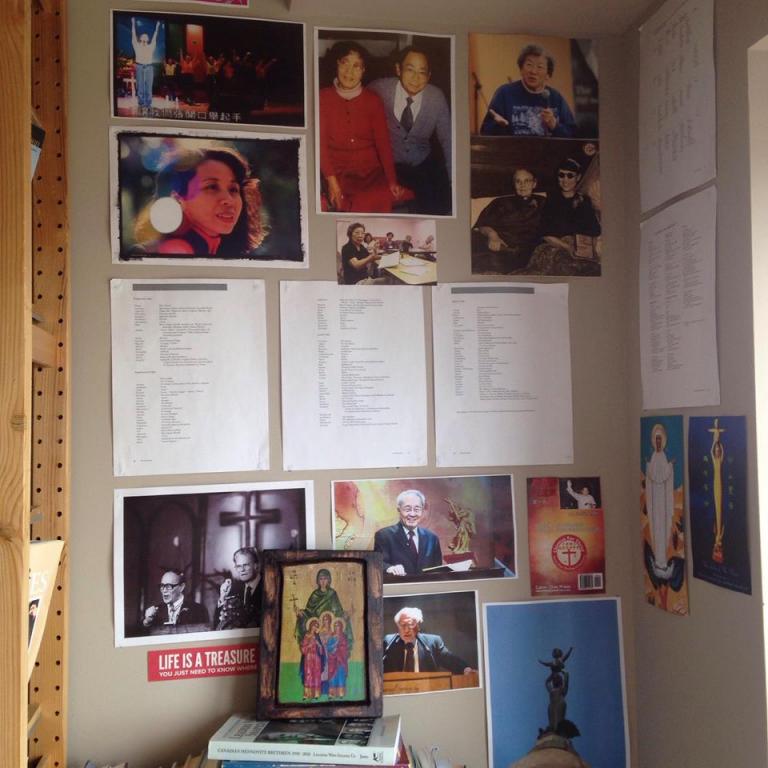
This Sunday after the Exaltation of the Cross is the gift that keeps on giving. The Apostol reading at the Divine Liturgy was from the part of the letter of the Holy Apostle Paul to the Church in Galatia. In it, he talks about how he has been crucified with Jesus the Messiah. Because of that, he says that it is no longer he who is living, but the Messiah – the Christ – living in him.
These words, assigned for the Sunday after the Exaltation, are special to me as I ponder the anniversary of my baptism in the Chinese church today, a day that on the Old Calendar this year just so happens to coincide with the Feast of the Holy Martyrs Sophia and her daughters Faith, Hope, and Love. I mentioned in my last post that I was baptized by a congregation that has an airtight claim to being part of the Church of China. Chinese for Christ, Church of Hayward, was founded by the Rev Stephen Chiu, an evangelist from Republican China who escaped from torture by the communists and ended up in the United States, where his ministry was directed toward Chinese graduate students, mostly from Taiwan. It was they who had asked him to move with them to the San Francisco Bay Area, where many of them had found employment either as researchers at Berkeley or entrepreneurs in Silicon Valley. He did, our congregation was founded, and those dear women and men who had brought him over were the people I called auntie and uncle when I was growing up, speaking Mandarin and Cantonese with them depending on which one they preferred.
Pastor Chiu, as I’ve said before, had his problems, and I am not afraid to talk about them because he remains a towering figure within the global orbit of Chinese Christianity, so it’s not like I am making public what is private. He was a confessor of the faith, but that did not make him perfect. He had, for example, studied economics, and he would often say, Where there is Christianity, there is prosperity! He would then compare China to America and argue that the reason that the United States was prosperous was because it was a Christian nation. It was a bit of a stretch, and we should have known it at the time, as our congregation was literally located in the middle of contested gang territory in Hayward and our buildings were regularly subjected to drive-by shootings. The other problem that he had was an immense spiritual intensity that he passed on to his students. One by one, I have watched his disciples fall prey to sexual temptation, many in spectacularly public ways, beginning with the first that tore the congregation apart when I was ten and that was arguably part of the series of cases in the Chinese church in the San Francisco Bay Area that led to a series of reforms across congregations by a network of Chinese church leaders who were concerned that leadership without constraint in these communities was untenable. From my perspective, the only ones in the group he mentored who survived with their integrity seem to be those who were able to take the old man with a little bit of grain of salt.
As it was, I used to blame Chiu for the sins of his followers. But as I reflect, I think he had the right impulses. His, like many other Chinese Christians, was the way of the heart, the stirring movements reflected in the term gandong that could be used to guide spiritual discernment. This working by heart is necessary for a personally integrated approach to the world, to be sure. But it is also fire because it has an erotic dimension, and I don’t think the old man was prepared to deal with that when it came to those he mentored. As it is, I have forgiven him, and with it, as Sam Rocha predicted would happen as I lived into my Catholicism, I lost the asexuality that stemmed from the sexual phobia that originated from this traumatic experience. Sometimes, like most people who live in this world, Chiu just didn’t know what he was doing, and having myself been forgiven of so much, how can I not forgive him too?
But Chiu did have his spirituality, and like my sideways reading of the Taiwanese American charismatic group Stream of Praise’s title song earlier today, his prayer reflected the approach toward God that the Chinese church has been trying to perfect. Expecting martyrdom, he had written a song. We sang it all the time at church and even at home. The Chinese goes in Mandarin: 不再是我, 不再是我,乃是基督在我裡面活 (bu zai shi wo, bu zai shi wo, nai shi jidu zai wo li mian huo). Committed as I am to woodenly literal and awkward translations, mine is roughly: Not me anymore, not me anymore, yet it is Christ inside of me living. These are literally, in other words, the words of the Holy Apostle Paul in today’s Apostol.
I take the centrality of Chiu’s spirituality – the heart as the mercy seat of our Messiah God, crucified and risen – as a contradiction to his prosperity gospel, American Christian nationalism, and erotic disintegration. In fact, dealing with those contradictions has been part of my wonderful mystagogy in the Kyivan Church, and as I think about it, it is not too much of a stretch to say that I found my heart’s desire in this church not only because I had known it all along, but also because I had to convert in order to see clearly enough to deal with the baggage that surrounded it.
At its core, this spirituality of it not being me anymore living but the Messiah in me living is the prayer of martyrdom. Is this not, after all, the same spiritual core that animated the daughters of the Holy Martyr Sophia to suffer at the hands of the Roman Empire in terribly grotesque ways and yet live even through the torture? Is not this resurrectional joy that which gives hope to the cruciform tears of the Holy Martyr Sophia at the graves of her children so that she literally dies with them and rises in glory? Is not the prayer of the Holy Martyrs Sophia and her daughters Faith, Hope, and Love the same impulse that animated the confessors of the faith in the Chinese church, including Pastor Chiu?
The comparison among the Church of China, the Church of Rome (in which Sophia and her daughters worshipped), and the Church of Kyiv is apt. We are churches of martyrs, and the attempts to deny the history of that martyrdom by aligning with empire compromises that witness. Pastor Chiu and the Holy Women-Martyrs offer universal witnesses; this is why we know Sophia’s daughters in the churches of the Kyivan tradition as Vera, Nadiya, and Lyubov. This universality is a sign of our catholicity, and it is why I am able to find what I am looking for in the Church of Kyiv though I am from the Church of China, and it is also why the Kyivan Church and Latin Church are ultimately able to be in full communion. The altars around which we gather are constructed from the bones of those who bear witness to the risen Christ living within them. They are reminders as we take the Body and Blood of Christ into our bodies, we offer a sign to the world that it is not me anymore, not me anymore, yet it is Christ inside me living.
I was baptized into this spirituality of martyrdom. For me, it is the heart of Christian prayer, that which makes the prayer of the heart possible in the first place – that Christ has sent his spirit into our hearts crying, Abba, Father! This was the animating heart of Chiu’s deeply intense spirituality, the one for which I not only forgive him, but also now see as driving his survival as a confessor of the faith and therefore necessary for life itself, albeit with the skills of chaste integration that I have been picking up in the Church of Kyiv in communion with Rome. I am thankful to the Lord that he has made this coincidence happen this year on the Old Calendar with my baptismal anniversary. I am sitting with it, just as I have been sitting with the receptions we have had this summer in our Richmond temple and the intersections of the Kyivan Church throughout my academic life.

